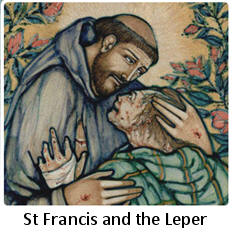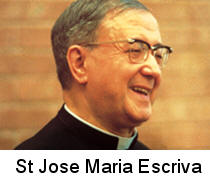Catholic Medical Quarterly Volume 64(4) November 2014
Faith in Medicine
The Santification of Work – A brief reflection.
Mgr John Walsh
 Is
it possible for my faith to make a real impact on my studies, and indeed
my life in general? It sounds like a strange question to ask in a
Christian environment. But if we take a close look at our day-to-day
lives, we might be surprised at how easily we fall into that frequent
separation between what I profess and celebrate in church, and how I live
my daily life.
Is
it possible for my faith to make a real impact on my studies, and indeed
my life in general? It sounds like a strange question to ask in a
Christian environment. But if we take a close look at our day-to-day
lives, we might be surprised at how easily we fall into that frequent
separation between what I profess and celebrate in church, and how I live
my daily life.
‘Be perfect as your Heavenly Father is perfect.’ The teaching of Jesus could not be clearer; there is to be a coherent and transparent unity of faith and daily life in the lives of his disciples. Throughout the history of the Church, this Gospel imperative has sometimes been obscured. Holiness has been seen as the preserve of those in holy orders and the consecrated life. The Second Vatican Council re-presented this Gospel teaching in a clear way;
‘All Christians in any state or walk of life are called to the fullness of Christian life and to the perfection of charity’ (Lumen Gentium 31)
‘By their very vocation, they seek the Kingdom of God by engaging in temporal affairs and by ordering them according to the plan of God. They live in the world, that is, in each and in all of the secular professions and occupations.’ (Lumen Gentium 31)
 If
we are to seek holiness in our day-to-day lives, in the middle of our
professional occupations, then how are we to go about it? Almost 40 years
before the Second Vatican Council opened, a young Spanish priest was
already foreshadowing and living the teaching of the Council, and teaching
others to do the same. St Josemaria Escriva was inspired by God to
found Opus Dei in 1928. Put simply, Escriva saw and understood that God
wants to meet us and sanctify us in the most ordinary tasks of everyday
life. ‘It is in the midst of the most material things of the earth
that we must sanctify ourselves, serving God and all mankind’. Let
this be a starting point, then, for a brief reflection on our life of
study and how we can become saints by being faithful to our work.
If
we are to seek holiness in our day-to-day lives, in the middle of our
professional occupations, then how are we to go about it? Almost 40 years
before the Second Vatican Council opened, a young Spanish priest was
already foreshadowing and living the teaching of the Council, and teaching
others to do the same. St Josemaria Escriva was inspired by God to
found Opus Dei in 1928. Put simply, Escriva saw and understood that God
wants to meet us and sanctify us in the most ordinary tasks of everyday
life. ‘It is in the midst of the most material things of the earth
that we must sanctify ourselves, serving God and all mankind’. Let
this be a starting point, then, for a brief reflection on our life of
study and how we can become saints by being faithful to our work.
In this very busy world of ours, it might be tempting to think that the busier and more active we are, the more we can achieve. We are told that we must be productive, and on the face of it this sounds reasonable. But so often our activity can be aimless and busy just for the sake of it. If we are to make an offering to God of our daily activity and life, then we must desire to give him the very best. It can be anything we do, but all carried out with care, the right intention, and above all with love. So the truly productive Christian will be one who makes a careful and loving offering of all that is done to God. This is a beautiful path to sanctity. Often our work and effort will be hidden, but it will be all the more pleasing to God for that, and it will bear fruit. As students, we will sometimes experience the desire to dispense with our studies and just get on with the ‘job’. The temptation is to see our study as superfluous or an obstacle to what we really want to do. It is good of course that we keep an eye on the goal of our studies, our future professional life. But God has placed me here for a reason. He wants me to make careful use of this time of study, to be the best student I can possibly be, to acquire knowledge so that I might be a better professional and therefore of greater service to others.
 The
Church recognised the inspired teaching of St Josemaria Escriva when he
was canonised a saint by Blessed John Paul II in 2002. It really is
possible for us to become saints in and through our everyday lives.
Let us remind ourselves that this is our primary vocation; to be saints.
All the paths we follow in this world are intended to bring us to the same
end; sanctity, final union with God. In his wonderful little book of
points for meditation, called ‘The Way’ St Josemaria had some specific
advice for students. I conclude this brief reflection by quoting two
of his points;
The
Church recognised the inspired teaching of St Josemaria Escriva when he
was canonised a saint by Blessed John Paul II in 2002. It really is
possible for us to become saints in and through our everyday lives.
Let us remind ourselves that this is our primary vocation; to be saints.
All the paths we follow in this world are intended to bring us to the same
end; sanctity, final union with God. In his wonderful little book of
points for meditation, called ‘The Way’ St Josemaria had some specific
advice for students. I conclude this brief reflection by quoting two
of his points;
‘An hour of study for a modern apostle is an hour of prayer’. (No. 335)
‘Student: form yourself in a solid and active piety, be outstanding in study, have a strong desire for the ‘professional apostolate.’ And with that vigour of your religious and professional training, I promise you rapid and far-reaching developments.’ (No. 346).
